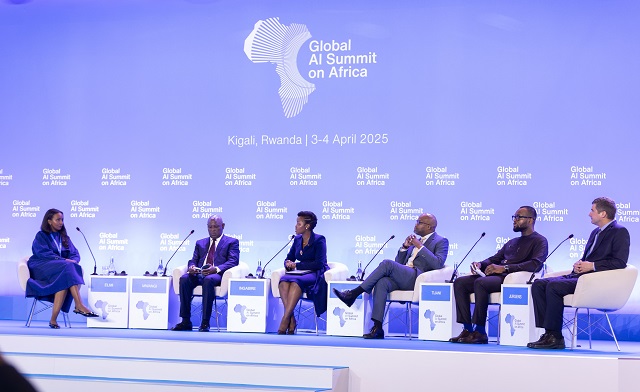
Fund aimed at creating 500,000 jobs annually and lifting 11million Africans out of poverty by 2030
ANALYSIS | IAN KATUSIIME | The Global AI Summit for Africa, held in Kigali, Rwanda from April 3–4, galvanized the continent’s ambition to harness the transformative power of artificial intelligence (AI) for sustainable development.
A landmark resolution was made to establish a $60 billion fund aimed at building a robust AI ecosystem across Africa—one that seeks to lift 11 million people out of poverty and create 500,000 jobs annually by 2030. The initiative comes at a critical time, as Africans currently represent just 4% of the global AI workforce, highlighting both the challenge and the immense opportunity for growth.
The ambitious fund will be pivotal in scaling AI development across Africa by supporting tech start-ups, accelerating digital economies, expanding internet connectivity, and financing critical digital infrastructure.
Held under the theme “AI and Africa’s Demographic Dividend: Reimagining Economic Opportunities for Africa’s Workforce,” the summit brought together African leaders, technologists, entrepreneurs, and policymakers to chart a collective path forward for inclusive and AI-driven economic transformation.
The event was organised by the Rwanda Centre for a Fourth industrial Revolution, Ministry of ICT and Innovation of Rwanda in collaboration with the World Economic Forum. The summit attracted 2,000 delegates and climaxed with the Africa Declaration on Artificial Intelligence that was hailed as a turning point for Africa’s AI journey.
The declaration seeks to leverage the potential of AI to drive innovation and competitiveness to advance Africa’s economies; position Africa as a global leader in ethical, trustworthy, and inclusive AI adoption; foster the sustainable and responsible development, deployment, and governance of AI technologies in Africa.
Rwandan President, Paul Kagame said Africa cannot afford to be left behind once again playing catch up.
“We have to adapt, cooperate and compete because it is in our best interest to do so.” Kagame told the gathering. The President acknowledged the uncertainty regarding privacy and safety but added there’s no other way around it other than using the technology.
“The potential for innovation and creativity on our continent is immense. That is already a comparative advantage which artificial intelligence can multiply. Right now, our strategy should be to go back to the drawing board and build a strong foundation for connectivity.”
AI stands to add $19.9 trillion
According to the World Economic Forum, Africa is home to the largest and fastest growing workforce in the world and therefore, the continent is poised to play a consequential role in the global AI ecosystem.
The Swiss-based body projects that AI stands to add $19.9 trillion to the global economy—injecting $2.9 trillion to Africa’s economy by 2030. With just five years away, it is a short timeline with key milestones.
It is for this reason that African leaders have decided to establish a $60bn AI Fund to leverage the opportunity at hand. Experts tipped on intermediation to mobilise long-term capital from international organisations as a way of financing Africa’s AI ambitions. They also hinted on pooling domestic capital for funding data centers, which are vital for enhancing Africa’s global competitiveness.
Clever Gatete, the Executive Secretary of the UN Economic Commission for Africa, said the body is working with the African Union Commission to develop a strategy that incorporates data, broadband infrastructure, and cyber security to drive AI adoption first from a regional and then a continental perspective. The overarching goal is to fast track the implementation of the Africa Continental Free Trade Area (AfCFTA).
Rwanda as a country has made strides in driving up AI adoption through deliberate policies and frameworks. Rwanda’s Minister of ICT and Innovation, Paula Ingabire, said that innovation and regulation must co-exist; explaining that the country put in place guidelines to ensure that the use of AI solutions across industries is done in an ethical and responsible manner.
“We created regulatory sandboxes to test and learn while we are deploying these solutions responding to some of the fundamental challenges we have in society,” Ingabire said.
The minister told the summit that Rwanda has invested in collaborating with researchers, academia, policymakers, tech companies, to build AI standards. One of the stand out collaborations is the partnership struck in 2011 between the Rwandan government and the US-based Carnegie Mellon University to establish a campus in Kigali called Carnegie Mellon University Africa.
CMUA has committed to developing the next generation of AI engineers through its Master of Science in Engineering Artificial Intelligence program. It is one of the first graduate programs in Africa tailored to AI where students learn to combine a foundation in artificial intelligence, machine learning, and data science.

Rwanda AI Scaling Hub
Another highlight of the summit was the signing of an agreement between the Rwandan government and the Gates Foundation to establish the Rwanda AI Scaling Hub whose goal is to accelerate development of AI technologies in Rwanda and across Africa.
The agreement was signed by Ingabire, the Minister of ICT, and Dr Trevor Mundel, President of Global Health at the Gates Foundation. The Gates Foundation pledged $7.5m as seed capital.
The Hub will serve as a central platform to identify and scale high-impact AI solutions geared towards addressing critical national and regional challenges. The hub will start with three sectors; healthcare, agriculture and education.
With this hub, healthcare workers can easily manage prevalence and incidence as affected areas are easily mapped out. This would also make it easier to coordinate with the ministries of health of neighbouring countries.
Darlington Akogo, Founder and CEO of minoHealth AI Labs, based in Ghana is doing this in West Africa. minoHealth’s AI system supports 30 different medical imaging modalities including x-rays, mammograms and microscopies.
Akogo’s goal, he said, was to democratise healthcare to address fundamental challenges African countries face around medical care. AI has vastly expanded their scope.
minoHealth’s AI system called Moremi, runs the gamut in the healthcare space from diagnosis, treatment planning, triage to prognosis of several hundred ailments. The company has also ventured into drug discovery for epidemics like malaria. minoHealth has since expanded its operations into Nigeria, Africa’s most populous country. The plan for the new AI hub in Rwanda is to replicate such efforts in East Africa.
According to the Rwandan Ministry of ICT, the signing of the agreement signals a shared commitment to building an African-led AI ecosystem with partners like the Gates Foundation, which provided financial support for minoHealth in Ghana.
Health Intelligence Centre
In another significant step toward harnessing technology to improve health outcomes, Rwanda’s Ministry of Health launched a Health Intelligence Centre — a comprehensive hub for collecting, analyzing, and leveraging health data. The launch was presided over by Dr. Sabin Nsanzimana, Rwanda’s Minister of Health, who was joined by fellow health ministers from across the continent.
The ministry said the center leverages real-time data from communities and health facilities to track trends, enhancing evidence-based disease surveillance.
“It will enable timely decision-making, efficient resource allocation, and policy adjustments to drive impactful change in healthcare,” a statement said.
But to optimise such efforts, African countries will need to align their energy infrastructure. Chido Munyati, Head of Africa at the World Economic Forum, revealed that only 43% of people on the continent have access to electricity, which makes it hard to adopt and scale emerging technologies.
“Take AI infrastructure for example, to build and run these energy intensive components; high performance computer clusters, next generation networks and data centres, it is not just going to require more electricity, but exponential electricity,” Munyati said.
He stressed that generative AI requires 33% more electricity than traditional software. He added that the public and private sectors must come together to quickly scale energy infrastructure to build intelligent economies.
“It’s going to require about $400bn in investment by 2050 across traditional and renewable energy sources to meet our current demand,” he said.
The essence of energy infrastructure is rooted in the need for building data pipelines. Data has been described as the oxygen of the AI economy, and for this, experts say Africa must have robust data centres to enable cross-border data flow.
For that, the summit underscored the importance of data governance and harmonised regulation for African countries to set the ball rolling on developing AI technologies
AI governance
A session on AI governance revealed the actions needed to position Africa as a global player in AI. For entrepreneurs like Kate Kallot, CEO of AminiTech, a Nairobi-based AI and data firm, African governments need to make it easier for African businesses to set up in places such as the U.S. than at home.
Kallot also urged African countries to address regulatory instability for businesses to thrive. She added that the regulatory hurdles extend to registering intellectual properties and patents, which are key for research and development.
Kallot decried compute scarcity in the Global South. “Today it costs us more to import compute in Africa than it is to buy compute in the US. How do you expect us to continue fueling our research and training models that are adapted to our context locally if we have to send all our data outside?” she asked.
Compute or compute clusters are multiple computers working together as a single network. “African innovation cannot be locked outside of the continent.”
The age of algorithms and automations is now fully entrenched. X users inundate the app’s AI assistant Grok with all kinds of questions to which it generates tons of answers. Meta platforms; Facebook, Instagram and Whatsapp have AI tools that keep their users engaged. ChatGPT is now an essay companion.
On a broader scale, humans are increasingly relying on AI for activities like transportation, shopping, security, accounting and agriculture. Logistics managers are using the technology to measure freight, airlines are using AI solutions to read weather patterns, and defence contractors have piloted drone warfare in conflicts.
Researchers at the University of West England in the UK are using generative AI to decode the emotions of pigs for their well-being.
In spite of the leaps, questions linger among AI developers and policymakers on how to stem misuse and danger. UNDP AI Trust and Safety Expert, Jennifer Louie, underscored the role of African startups and local innovators in shaping new norms, models and markets for the future of safe use of AI.
The UNDP has since started an AI Trust and Safety Reimagination Programme that among others seeks; to gather practical experiences and data on how AI products and systems manifest new risks that create harm in local contexts; lay the foundations for equitable and safe AI development ecosystems that support local startups and the safe application of AI in developing countries.
The programme also explores innovative partnerships that ensure safety-by-design in the early stage of AI development and deployment.
 The Independent Uganda: You get the Truth we Pay the Price
The Independent Uganda: You get the Truth we Pay the Price



